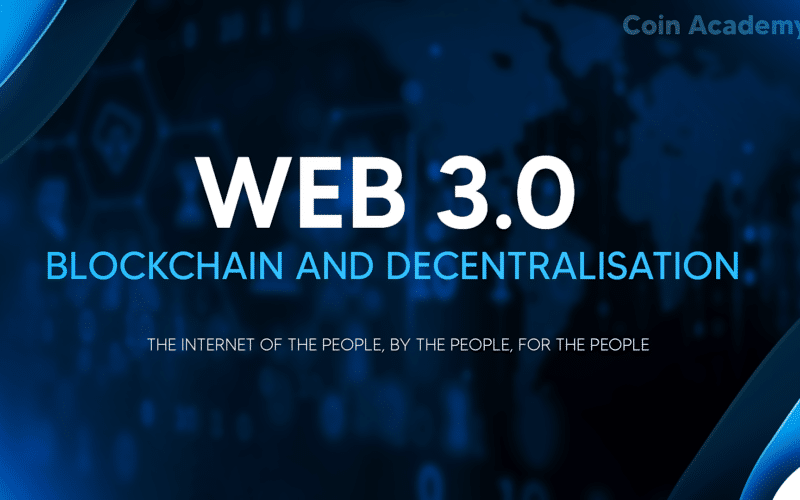Gain an understanding of the stakes and perspectives at play in Internet’s decentralized future, thanks to the blockchain and cryptocurrencies.
The Internet of the people, by the people, for the people
“Technology has always been a story of decentralization […]. From the printing press to the Web and the Bitcoin, technology has the ability to distribute power far and wide.”
At the dawn of the 21st century, the Internet era and the digital revolution are in sight. Online giants take root in the political, economic and social landscapes to the point of becoming our primary means of interaction and communication.
GAFA’s have mustered [technological] power that defies citizens as well as states. The centralization of this power has already shown anti-democratic tendencies, notably through the lack of transparency of these companies (personal data, safety, algorithms). Web 2.0 was structured in the context of this monopolization of digital production and innovation.
Nevertheless, a handful of forward-thinkers, dubbed the CypherPunks, undertook profound reflections and theories based on the crypto-anarchist philosophy. This movement enabled the genesis of the Blockchain tech along with its major feature, cryptocurrencies.
The Blockchain tech and the resulting crypto-assets are at this point perceived as a gigantic scam by conservative observers; for the more progressive ones, it is seen as a revolution for the Web and digital and social interactions.
Table of Contents
- The Internet of the people, by the people, for the people
- The digital era and Internet’s first steps
- Decentralization, the true revolution of the 21st century
- Cryptocurrencies, a new asset and a new power
- Crypto Galaxy, adoption and transition
- The rise of the crypto-economy, a pyramid turned upside-down
- Popularization and democratization of the crypto-system
The digital era and Internet’s first steps
The digital advent marks the start of a new era, with the rapid development of businesses and investments in assets of the digital sector. These new financial assets have known a steady growth and sparked a stock market frenzy which, between the late 20th century and the Internet crisis, lead to a speculative bubble bursting, thereby disrupting this young sector and its credibility.
In the second half of the 2000’s, digital companies started the democratization process of the Internet at an international scale. The societal evolution and transition towards the digital era were radical. The inception of social media shook exchanges and communication to the core, e-commerce websites started impacting consumption behaviors and entertainment content creation rose starkly as a result of these new networks. Silicon Valley became a laboratory for future companies, and digital businesses already started demonstrating their growth and innovation potential.
Web Giants
Here comes the advent of the GAFA’s, digital giants that now hold a monopoly over platforms, content, networks and user data. This monopolization of the digital sector is a threat not only for states, but also for citizens. Political and democratic challenges, highlighted by recently unearthed cases such as Cambridge Analytica and Facebook Files, demonstrate the legitimacy of concerns over the centralization of digital power in the hands of a few actors.
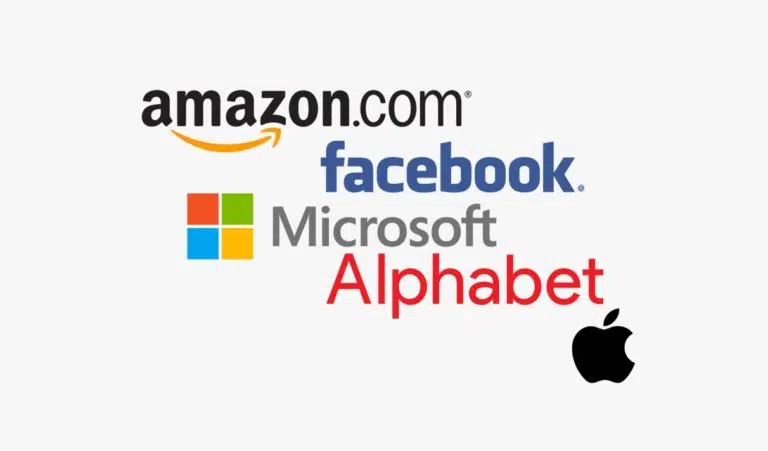
Moreover, the business of selling user data shows that centralization tends to treat users as products; they are not only users but also, maybe above all, used. Opportunities offered by the blockchain allow users to be actors of this network, providers of their own data if they so wish, all the while selecting which data they provide, to whom and with what aim. The user becomes an actor in the network.
The Gamestop case, a modern rendition of the David versus Goliath duel, marked an important event when a network of amateur traders from Reddit, the “WallStreetBets”, succeeded in countering the plans of Wall Street experts. They transformed this quasi-fanatical struggle into a genuine earthquake that made the stock market shudder, and observers worry over the power of the “individual”. Institutions and mainstream media voiced their concerns regarding “popular interference” in the closed financial sector. The user-product became a user-actor and displayed their will to act.
Decentralization, the true revolution of the 21st century
Crypto-anarchism, democracy’s strongest ally
Blockchain tech was born to decentralize the web and enable users to become actors and managers of the Internet and its content. Its asset, the Bitcoin was the first successful cryptocurrency, and is based on a decentralized design.
The latter allowed for other projects to see the light of day, such as Ethereum which is now the second biggest cryptocurrency on the stock market, and related web applications that were used to found these crypto-ecosystems.
This technological advancement, which I would call a “revolution”, gives the possibility for centralized institutions, states, banks and digital companies, to rethink their centralized founding models and to position the user back at the heart of their decisions and goals.
The user-fueled Web 3.0
User-products become actors of Web 3.0, they fund projects and have a say in the auto-governance of some platforms like DAO’s. Miners can now act by mining cryptocurrencies, and secure transactions on the blockchain in return for a compensation called “Gas Fees”.
This decentralization caused a revolution in creativity and innovation, with hundreds of crypto-assets emerging in the form of cryptocurrencies or tokens. Blockchains compete with each other and allow for the emergence of new applications used to structure them and optimize their use and relationships, aiming for the interoperability of blockchains.
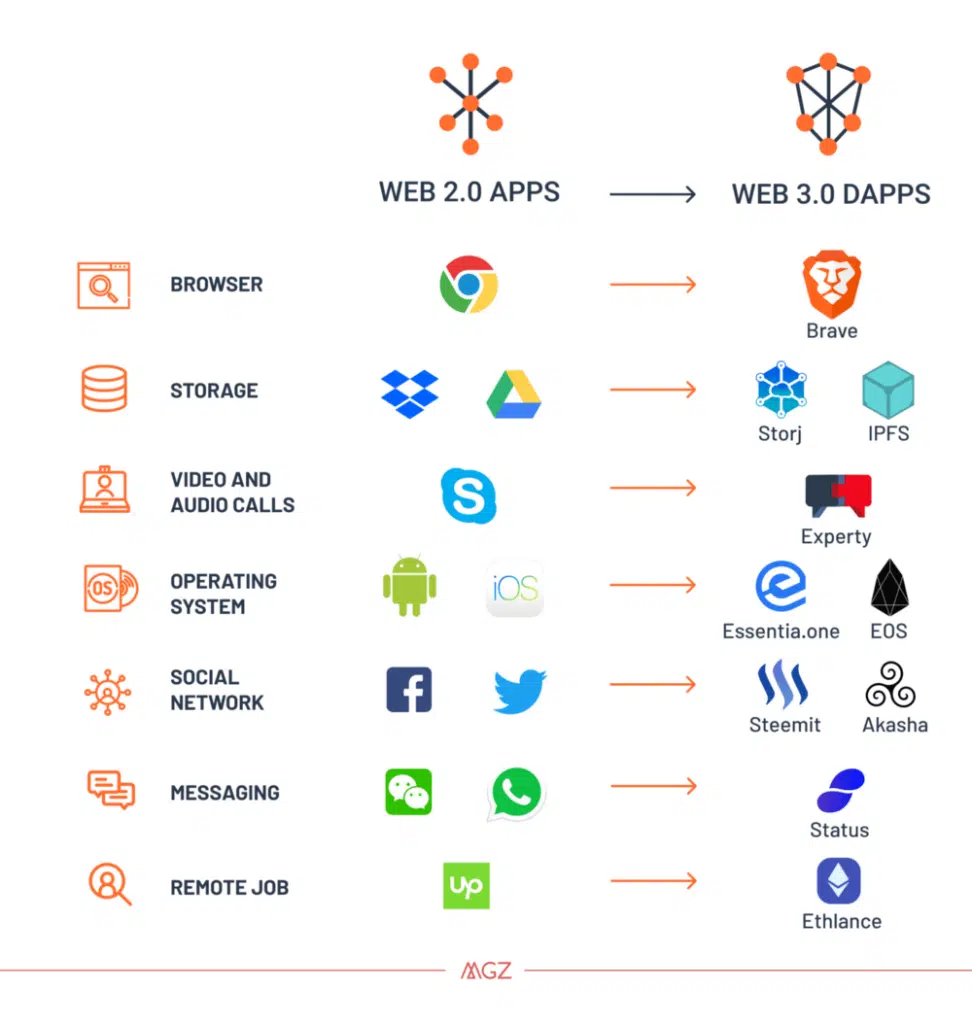
Cryptocurrencies, a new asset and a new power
Smart contracts, decentralized finance and governance
The main characteristics that make blockchains and crypto-assets a technological revolution are their usefulness and relevance. In the mid-90’s, Nick Szabo developed the concept of smart contracts, similar to traditional ones but digitized and for which execution is not governed by any legal framework. Third parties are dispensed with thanks to the blockchain tech, which ensures a contract’s terms and conditions are secure and unfalsifiable.
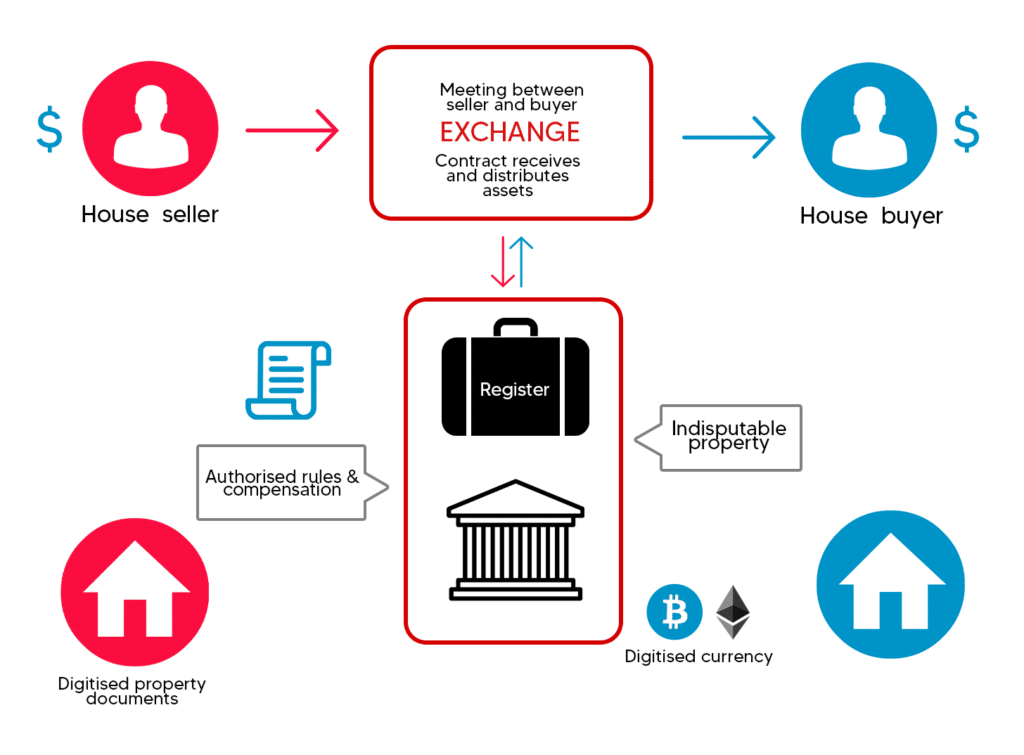
Smart contracts and DeFi
DeFi, Decentralized Finance, is an economic revolution that overturned the traditional paradigm according to which finance is a matter exclusively dealt with by institutions and specialized professions.
DeFi allows users, simply equipped with a smartphone or PC, to request a loan or open a saving account thanks to dedicated services on the blockchain. Nowadays, private individuals are in the capacity to become a new form of banking institution, the “decentralized bank”. The banking system is a popular institution in the West, but in many other regions, it doesn’t reach every layer of society, which impedes their development.
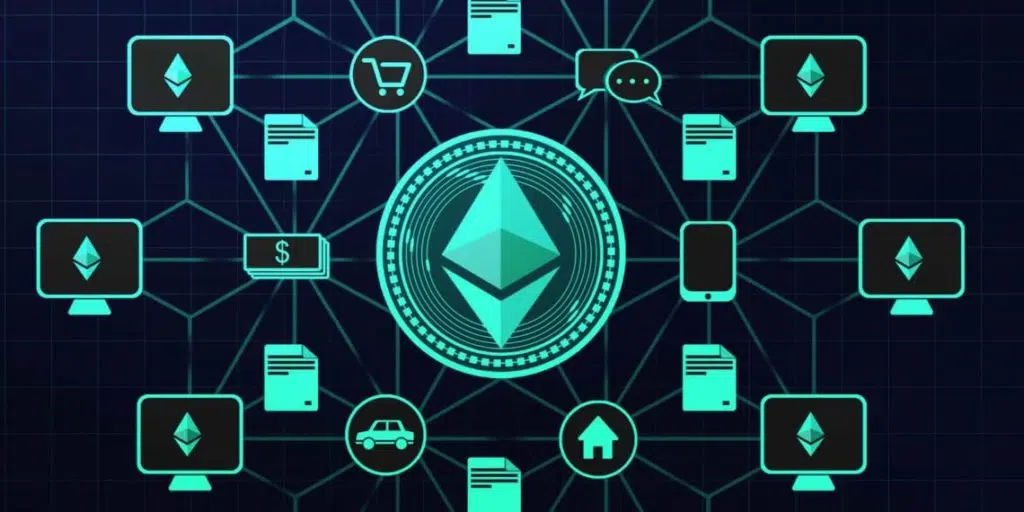
Imagine now the doors this could open in regions like Africa, where the failure of centralized banks to fulfill their duty is undeniable; DeFi could give real opportunities for growth and development in such regions. The Play-to-Earn phenomenon, based on the NFT technology, is garnering a large success in South-East Asia in particular, and currently underdeveloped countries could benefit from the development of decentralized technologies, and use them to emancipate.
Cryptocurrencies, a new class of asset
Cryptocurrencies are now considered to be financial assets, ETF projects are being worked on and numerous institutional funds are taking an interest in this technology and investing in this type of assets, from cryptocurrencies to NFT’s. This is notably shown by the acquisition of CryptoPunk #7610 for €141,000 by VISA, the payment tech giant. The difference I would point out with the Internet bubble is the decentralization effort and the involvement of private individuals and amateurs in the crypto market, contrary to the Internet one which only took place on the traditional stock market.
Crypto Galaxy, adoption and transition
The rise of the crypto-economy, a pyramid turned upside-down
While cryptocurrencies, like any other revolution, initially aroused fear and rejection, they proved to be an actual tool to reappropriate functions that are essential to society. The main counterweight to political power is economic, and decentralized technologies will enable citizens to suggest or even implement projects aiming at political decentralization based on these web technologies. Cryptocurrencies and the blockchain were founded on anarcho-capitalist ideals, and the traditional liberal world therefore has to face a new actor, the individual.
The revolution this represents resides in its governance and decision process designed as a reversed pyramid. Users of traditional systems were placed at the bottom of the pyramid, and it is now time for decentralization to place them back at the heart of projects, and at earlier stages of decisions. Going back to the example of appropriation and commercialization of data, in which users are just products, it is now up to them and their collective intelligence to take control and reclaim their digital identity. This technology demonstrates that the technical and practical application of the blockchain has a real innovation potential for industrial sectors.
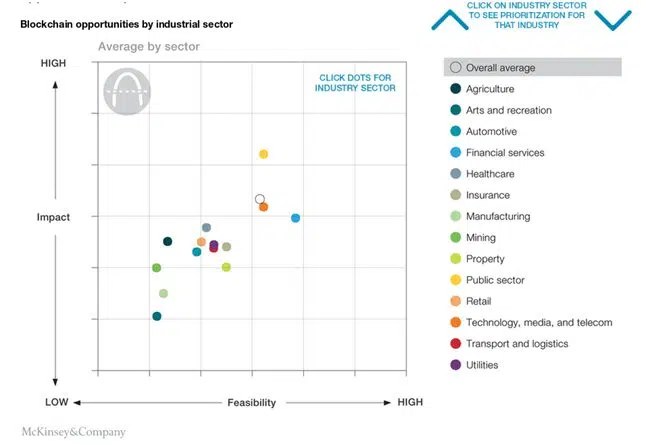
Popularization and democratization of the crypto-system
While the popularization of crypto-assets and their ecosystem is still in progress and in constant evolution, financial interests remain the main driving force behind private investments. Some states are considering their adoption as legal currency, Salvador having become the first country to accept Bitcoin as legal currency, following a decision made by its president Nayib Bukele.
This decision is however criticized with regards to its method of introduction, deemed authoritarian and contrary to this technology’s principles according to Vitalik Buterin who expressed as much on Reddit: “Making the acceptation of a specific cryptocurrency mandatory for businesses is contrary to ideals of freedom that are supposed to be paramount in the crypto-space […]”.
The main issue with blockchain technologies, in the perspective of a worldwide use, is their scalability. Scalability is used here as the capacity of a network to bear large amounts of transactions without incurring saturation. We noticed with the Ethereum network that this data storage issue could hinder the development and adoption of a blockchain and its asset.
Lastly, the crypto-ecosystem and its democratization are structured through this ecosystem’s influencers. Their most visible member is Elon Musk who promoted Dogecoin, cryptocurrencies and their technology. His passion for this ecosystem is not surprising, considering his membership in the “PayPal Mafia”.
Blockchain technologies and cryptocurrencies represent an innovation on the verge of revolutionizing the traditional system, thereby impacting politics, the economy and social interactions. Each industrial sector will benefit from the blockchain and each individual is able to become an essential actor in the network. Users feed it, miners protect it, and developers innovate.
“BITCOIN WILL DO TO BANKS WHAT EMAILS DID TO THE POSTAL SECTOR” – Rickard Falkvinge, President of the Swedish Pirate Party
Sources
- Les Cyberpunks : https://www.labourseauquotidien.fr/bitcoin-lecon-cypherpunks/
- B. Loveluck – Internet, une société contre l’État ? Libéralisme informationnel et économies politiques de l’auto-organisation en régime numérique, 2015. https://halshs.archives-ouvertes.fr/halshs-01172584v2/document
- La revue des médias, entretien avec Romain Badouard : “Internet et démocratie, le grand désenchantement ? https://larevuedesmedias.ina.fr/internet-et-democratie-le-grand-desenchantement
- Les fonds institutionnels à l’assaut des cryptos : https://www.journaldunet.com/economie/finance/1494759-pourquoi-les-investisseurs-institutionnels-s-interessent-plus-que-jamais-aux-cryptomonnaies/
- Le Web 3.0 : https://www.redsen-consulting.com/transformation-digitale/ce-que-vous-devez-savoir-sur-le-web-3-0/
- Blockchain, les cas d’usages : https://itsocial.fr/enjeux-it/enjeux-innovation/blockchain/etude-cas-dusages-de-blockchain/
- Les enjeux de la blockchain – Ministère de la défense : https://www.strategie.gouv.fr/publications/enjeux-blockchains
- Les smarts contracts : https://www.journaldunet.fr/patrimoine/guide-des-finances-personnelles/1208979-smart-contract/ & https://blockgeeks.com/guides/fr/contrats-intelligents/
- Cambridge Analytica : https://www.lemonde.fr/pixels/article/2018/03/22/ce-qu-il-faut-savoir-sur-cambridge-analytica-la-societe-au-c-ur-du-scandale-facebook_5274804_4408996.html
- Facebook Files : https://www.francetvinfo.fr/internet/reseaux-sociaux/facebook/facebook-files-ce-qu-il-faut-retenir-des-revelations-accablantes-de-la-lanceuse-d-alerte-frances-haugen_4796783.html
- Le cas Gamestop : https://www.lecho.be/les-marches/actu/general/un-cas-gamestop-peu-probable-en-europe/10286547.html
- La DeFi, Square se lance dans la finance décentralisée : https://www.lefigaro.fr/flash-eco/square-se-lance-dans-la-finance-decentralisee-autour-du-bitcoin-20210716#:~:text=La%20finance%20d%C3%A9centralis%C3%A9e%20consiste%20en,directement%20d’utilisateur%20%C3%A0%20utilisateur.
- Blockchain et lutte politique : Hong Kong https://www.cointribune.com/analyses/monde/restrictions-crypto-en-chine-comment-cela-influe-sur-hong-kong/
- Salvador, le bitcoin une monnaie légale : https://www.lemonde.fr/international/article/2021/09/07/le-bitcoin-devient-une-monnaie-legale-au-salvador_6093664_3210.html
- Salvador, minage volcanique : https://journalducoin.com/bitcoin/salvador-le-minage-bitcoin-by-volcano/
- Mafia Paypal : https://www.clubic.com/pro/entreprises/paypal/article-847677-1-mafia-paypal-devenus-fondateurs-entreprise.html
